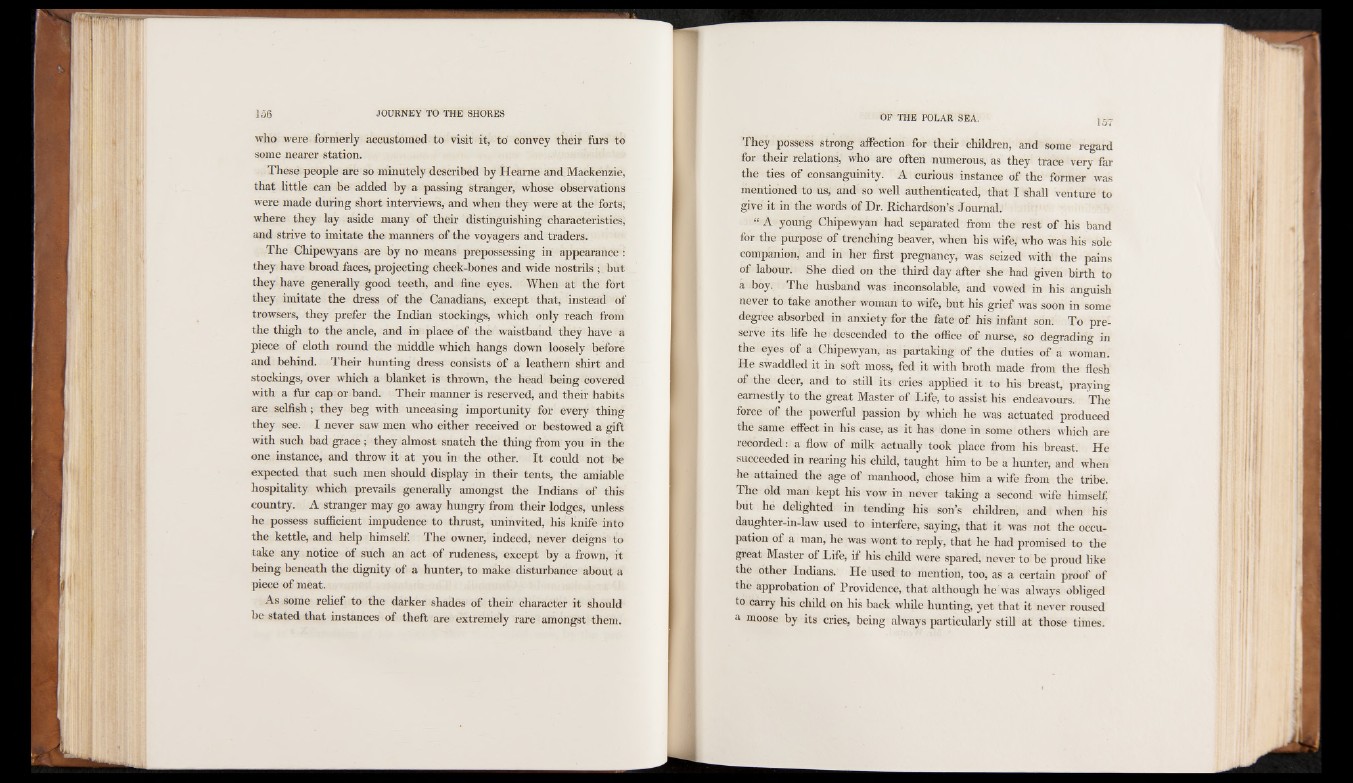
who were formerly accustomed to visit it, to convey their furs to
some nearer station.
These people are so minutely described by Hearne and Mackenzie,
that little can be added by a passing stranger, whose observations
were made during short interviews, and when they were at the forts,
where they lay aside many of their distinguishing characteristics,
and strive to imitate the manners of the voyagers and traders.
The Chipewyans are by no means prepossessing in appearance:
they have broad faces, projecting cheek-bones and wide nostrils ; but
they have generally good teeth, and fine eyes. When at the fort
they imitate the dress of the Canadians, except that, instead of
trowsers, they prefer the Indian stockings, which only reach from
the thigh to the ancle, and in place of the waistband they have a
piece of cloth round the middle which hangs down loosely before
and behind. Their hunting dress consists of a leathern shirt and
stockings, over which a blanket is thrown, the head being covered
with a fur cap or band. Their manner is reserved, and their habits
are selfish; they beg with unceasing importunity for every thing
they see. I never saw men who either received or bestowed a gift
with such bad grace ; they almost snatch the thing from you in the
one instance, and throw it at you in the other. It could not be
expected that such men should display in their tents, the amiable
hospitality which prevails generally amongst the Indians of this
country. A stranger may go away hungry from their lodges, unless
he possess sufficient impudence to thrust, uninvited, his knife into
the kettle, and help himself. The owner, indeed, never deigns to
take any notice of such an act of rudeness, except by a frown, it
being beneath the dignity of a hunter, to make disturbance about a
piece of meat.
As some relief to the darker shades of their character it should
be stated that instances of theft are extremely rare amongst them.
They possess strong affection for their children, and some regard
for their relations, who are often numerous, as they trace very far
the ties of consanguinity. A curious instance of the former was
mentioned to us, and so well authenticated, that I shall venture to
give it in the words of Dr. Richardson’s Journal.
1 A young Chipewyan had separated from the rest of his band
for the purpose of trenching beaver, when his wife, who was his sole
companion, and in her first pregnancy, was seized with the pains
of labour. She died on the third day after she had given birth to
a boy. The husband was inconsolable, and vowed in his anguish
never to take another woman to wife, but his grief was soon in some
degree absorbed in anxiety for the fate of his infant son. To preserve
its life he descended to the office of nurse, so degrading in
the eyes of a Chipewyan, as partaking of the duties of a woman.
He swaddled it in soft moss, fed it with broth made from the flesh
of the deer, and to still its cries applied it to his breast, praying
earnestly to the great Master of Life, to assist his endeavours. The
force of the powerful passion by which he was actuated produced
the same effect in his case, as it has done in some others which are
recorded: a flow of milk actually took place from his breast. He
succeeded in rearing his child, taught him to be a hunter, and when
he attained the age of manhood, chose him a wife from the tribe.
The old man kept his vow in never taking a second wife himself
but he delighted in tending his son’s children, and when his
daughter-in-law used to interfere, saying, that it was not the occupation
of a man, he was wont to reply, that he had promised to the
great Master of Life, if his child were spared, never to be proud like
the other Indians. He used to mention, too, as a certain proof of
the approbation of Providence, that although he was always obliged
to carry his child on his back while hunting, yet that it never roused
a moose by its cries, being always particularly still at those times.